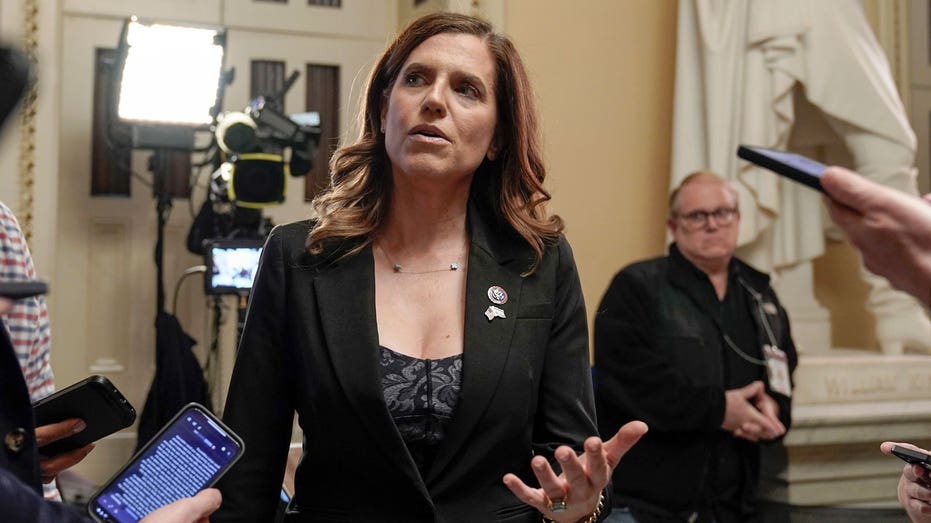Party of Reagan? Please. This GOP Is the Appeaser Generation.
Forty years ago, Jeane Kirkpatrick, a hawkish former Democrat who was Ronald Reagan’s U.N. ambassador, electrified the 1984 Republican convention by railing against the supposed “Blame America first” weakness of the Democrats. Kirkpatrick, a prominent neoconservative, claimed that the Democrats were behaving “less like a dove or a hawk than an ostrich—convinced it would shut out the world by hiding its head in the sand.” Kirkpatrick was adroitly playing off imagery that had haunted the Democrats since the era of Harry Truman, when right-wingers mockingly asked, “Who lost China?” The Democrats in the 1970s and 1980s—personified by George McGovern, Jimmy Carter, and Walter Mondale—were widely portrayed as blundering global innocents who wanted to put flowers in the barrels of guns as they sang “Kumbaya.”This political typecasting is hard to shake. Even before the war in Gaza created deep fissures in the Democratic Party, polls last fall showed Donald Trump besting Joe Biden on national security issues. According to the 2020 exit polls, voters who based their decision on which candidate was a “strong leader” went for Trump by a lopsided margin of 72 percent to 28 percent.Ukraine is the issue that upends these stereotypes. The Republicans, led by Trump, are the feckless appeasers, while the Democrats under Biden are the party of Reaganite strength.With Congress returning Tuesday (yippee), House Speaker Mike Johnson can once again diddle while Ukraine burns. Desperately groping along with a two-vote Republican majority and threats to his speakership from Marjorie Taylor Greene, Johnson has been spinning one unrealistic plan after another for Ukraine aid. At last count, the speaker is demanding that the military aid to the war-torn country be in the form of a loan; that the U.S. government arbitrarily seize Russian assets; and the Biden administration must support new terminals for liquefied natural gas exports, which (coincidentally, of course) would benefit his home state of Louisiana.That asking price is as inflated as the claimed number of floors at Trump Tower. What Johnson is offering (unless he changes his mind) is merely sending a package that includes aid to Ukraine to the House floor, where it would depend on overwhelming Democratic votes for passage. Johnson, by the way, voted against Ukraine aid last September, which was before his current claims that he is for it.Johnson was a backbench legislator then. That was before he became the designated survivor after the ouster of Kevin McCarthy last October left the House Republicans in limbo for three weeks. He is the embodiment of the Peter principle, which states that people are promoted in an organization until they reach a level where they demonstrate their own incompetence. It’s hard to believe, but the hapless Johnson has pulled off the trick of creating a bipartisan wave of Kevin McCarthy nostalgia.Fingering Johnson for Congress’s failure to provide bullets for Kyiv is akin to blaming the Russian Embassy in Washington for the invasion of Ukraine. Like everything else in the 2024 Republican Party, it begins and ends with Donald Trump. Decades from now, historians will probably still be arguing over the roots of Trump’s fan-boy fixation with Vladimir Putin. But whatever the motivation (from autocrat envy to straightforward corruption), Trump is pantingly eager to sell out Ukraine. On Sunday, The Washington Post published the contours of Trump’s (secret, but not surprising) plan to bring peace to Ukraine—giving Russia Crimea, most of the Donbas region, and probably anything else that is not nailed down. Trump, in short, has always been Neville Chamberlain on steroids.Senate passage in February of a $95 billion aid bill (with funds for Ukraine, Israel, and Taiwan) may be remembered someday as the last gasp of traditional hawkish Republicanism. Mitch McConnell, in his final months as GOP Senate leader, delivered 22 Republicans on the bipartisan vote as the retiring Mitt Romney declared in a floor speech, “If we fail to help Ukraine, we will be known not as our fathers and mothers were—the greatest generation—but as the worst generation.”Two months later, the worst generation is alive and well and living in Congress. In a startling move—especially coming from a prominent Republican—Mike Turner, who chairs the House Intelligence Committee, told CNN Sunday, “We see directly coming from Russia … communications that are anti-Ukraine and pro-Russia messages, some of which we even hear being uttered on the House floor.” Needless to say, it is not the Democrats who are mouthing Putin’s platitudes.If, charitably, there is a logic to the GOP position, it is that America should abandon Old Europe to pivot to battling China in the New Asia. The obvious problem with this glib reasoning is that Beijing just might notice that America is slamming the door on Ukraine two years after Putin’s unprovoked invasion. The security of Taiwan (which is a major U.S. source of semic

Forty years ago, Jeane Kirkpatrick, a hawkish former Democrat who was Ronald Reagan’s U.N. ambassador, electrified the 1984 Republican convention by railing against the supposed “Blame America first” weakness of the Democrats. Kirkpatrick, a prominent neoconservative, claimed that the Democrats were behaving “less like a dove or a hawk than an ostrich—convinced it would shut out the world by hiding its head in the sand.”
Kirkpatrick was adroitly playing off imagery that had haunted the Democrats since the era of Harry Truman, when right-wingers mockingly asked, “Who lost China?” The Democrats in the 1970s and 1980s—personified by George McGovern, Jimmy Carter, and Walter Mondale—were widely portrayed as blundering global innocents who wanted to put flowers in the barrels of guns as they sang “Kumbaya.”
This political typecasting is hard to shake. Even before the war in Gaza created deep fissures in the Democratic Party, polls last fall showed Donald Trump besting Joe Biden on national security issues. According to the 2020 exit polls, voters who based their decision on which candidate was a “strong leader” went for Trump by a lopsided margin of 72 percent to 28 percent.
Ukraine is the issue that upends these stereotypes. The Republicans, led by Trump, are the feckless appeasers, while the Democrats under Biden are the party of Reaganite strength.
With Congress returning Tuesday (yippee), House Speaker Mike Johnson can once again diddle while Ukraine burns. Desperately groping along with a two-vote Republican majority and threats to his speakership from Marjorie Taylor Greene, Johnson has been spinning one unrealistic plan after another for Ukraine aid. At last count, the speaker is demanding that the military aid to the war-torn country be in the form of a loan; that the U.S. government arbitrarily seize Russian assets; and the Biden administration must support new terminals for liquefied natural gas exports, which (coincidentally, of course) would benefit his home state of Louisiana.
That asking price is as inflated as the claimed number of floors at Trump Tower. What Johnson is offering (unless he changes his mind) is merely sending a package that includes aid to Ukraine to the House floor, where it would depend on overwhelming Democratic votes for passage. Johnson, by the way, voted against Ukraine aid last September, which was before his current claims that he is for it.
Johnson was a backbench legislator then. That was before he became the designated survivor after the ouster of Kevin McCarthy last October left the House Republicans in limbo for three weeks. He is the embodiment of the Peter principle, which states that people are promoted in an organization until they reach a level where they demonstrate their own incompetence. It’s hard to believe, but the hapless Johnson has pulled off the trick of creating a bipartisan wave of Kevin McCarthy nostalgia.
Fingering Johnson for Congress’s failure to provide bullets for Kyiv is akin to blaming the Russian Embassy in Washington for the invasion of Ukraine. Like everything else in the 2024 Republican Party, it begins and ends with Donald Trump. Decades from now, historians will probably still be arguing over the roots of Trump’s fan-boy fixation with Vladimir Putin. But whatever the motivation (from autocrat envy to straightforward corruption), Trump is pantingly eager to sell out Ukraine. On Sunday, The Washington Post published the contours of Trump’s (secret, but not surprising) plan to bring peace to Ukraine—giving Russia Crimea, most of the Donbas region, and probably anything else that is not nailed down. Trump, in short, has always been Neville Chamberlain on steroids.
Senate passage in February of a $95 billion aid bill (with funds for Ukraine, Israel, and Taiwan) may be remembered someday as the last gasp of traditional hawkish Republicanism. Mitch McConnell, in his final months as GOP Senate leader, delivered 22 Republicans on the bipartisan vote as the retiring Mitt Romney declared in a floor speech, “If we fail to help Ukraine, we will be known not as our fathers and mothers were—the greatest generation—but as the worst generation.”
Two months later, the worst generation is alive and well and living in Congress. In a startling move—especially coming from a prominent Republican—Mike Turner, who chairs the House Intelligence Committee, told CNN Sunday, “We see directly coming from Russia … communications that are anti-Ukraine and pro-Russia messages, some of which we even hear being uttered on the House floor.” Needless to say, it is not the Democrats who are mouthing Putin’s platitudes.
If, charitably, there is a logic to the GOP position, it is that America should abandon Old Europe to pivot to battling China in the New Asia. The obvious problem with this glib reasoning is that Beijing just might notice that America is slamming the door on Ukraine two years after Putin’s unprovoked invasion. The security of Taiwan (which is a major U.S. source of semiconductor chips) depends on China believing that Washington would keep its implicit promises to come to defense of the island. Deterrence disappears if America’s word is worthless.
In a presidential election year, it is tempting to claim that the Republican surrender monkeys will pay a large electoral price for their rediscovery of GOP isolationism. But politics in 2024 does not work like that, especially when Biden is an unfortunately weak advocate for his own cause. Aid to Ukraine is a niche issue, though it may matter at the margins. According to the census, there are an estimated one million U.S. residents who claim Ukrainian ancestry, with nearly 100,000 of them living in the swing state of Pennsylvania.
In the long term, though, deliberate Republican abandonment of Ukraine should never be forgotten. The modern GOP’s view of American interests appears to depend on Trump’s enterprises and his whims. Not since Charles Lindbergh appealed to many Republicans in 1941 with his speeches claiming that the Jews and the British were forcing America into war has a political party embraced appeasement with the avidity of Trump Republicans. May the day never come when Democrats have to ask accusingly, “Who lost Kyiv?”



